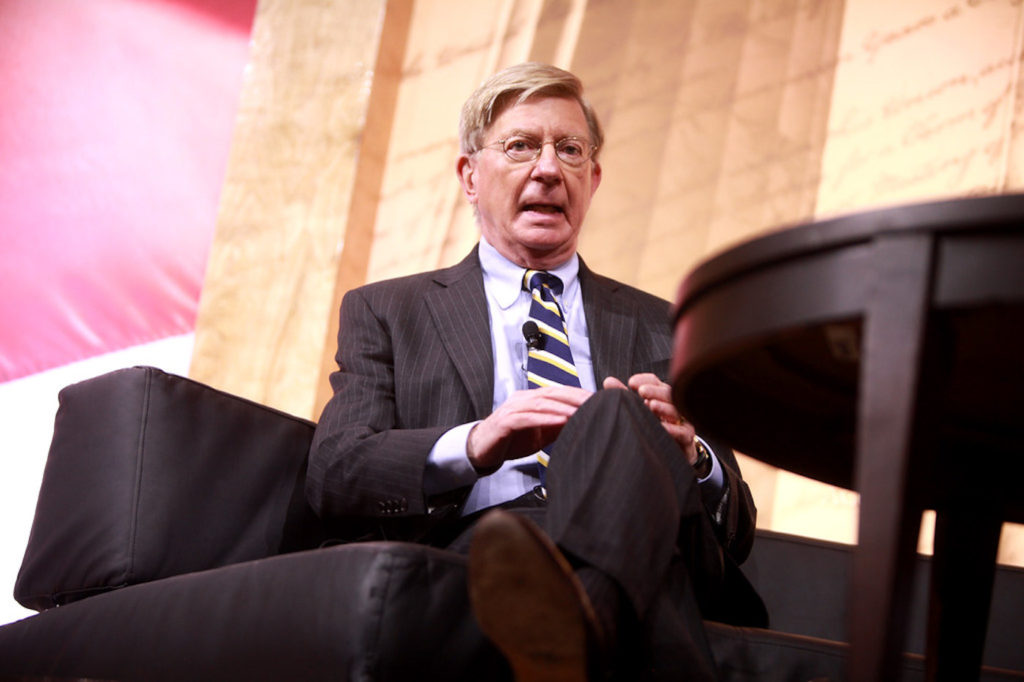George Will’s latest book, American Happiness and Discontents: The Unruly Torrent, 2008–2020, is a wise compendium on the tumultuous whirlwind that has been the last decade or so of American life. In addition to its historical, economic, and anthropological value, the book demonstrates Will’s rare combination of two unexpected qualities: attentiveness and toughness. He is attentive to the subtle (and sometimes not so subtle) cultural shifts shaping everyday life in America, and tough on Americans who wish to turn their backs on what has driven American success since the country’s inception: its unapologetic commitment to capitalism. In this review, I focus primarily on Will’s economic and cultural insights.
All That Is Solid Melts into Air
In this voluminous work, Will gives the reader a lesson in the fundamentals of capitalism. He often cites Karl Marx, not without irony, to make a case for capitalism’s power. “Creative destruction continues in the digital age,” a social churning that some Americans find unnerving, others exhilarating. Will stands firm on his capitalist principles, and nobody can accuse him of inconsistency when he goes against the grain of a vociferous right-wing activism, best exemplified by MAGA. This slogan’s pessimism is often a mirror image of Bernie Sanders’s socialist left. For Will, both these factions represent stasis, which is antithetical to the restless and dynamic capitalism at the core of American identity.
In fact, our current digital revolution is derivative of the very specific version of capitalism that developed in this country, making it a land of opportunity for so many. For Will, America’s economic system is “inextricably woven into the nation’s system of liberty.” Thus, his Economics 101 is more often than not directed at right-wing anti-capitalists than at the socialist left. That famous immigrant striver, Alexander Hamilton, regarded unpredictable, restless capitalism as the solvent for the entrenched hierarchies that inhibit social mobility. As Will states, “Right-wing anticapitalism has a long pedigree as a largely aristocratic regret. . . . The aristocrats were not wrong in seeing their supremacy going up in the smoke of industrialism’s smokestacks: Market forces by mass preferences do not defer to inherited status.”
Start your day with Public Discourse
Sign up and get our daily essays sent straight to your inbox.Pittsburgh has long been romanticized by the nostalgic right, so much so that when then-President Trump withdrew from the Paris Agreement, he matter-of-factly remarked that he “was elected to represent the citizens of Pittsburgh, not Paris,” to a rowdy applause from supporters gathered on the White House lawn. Trump had actually received far fewer votes in the former industrial city than had his Democratic opponent. Will reminds us that even Pittsburgh has “put aside smokestacks” for technology and healthcare. In fact, the restless culture of Silicon Valley was spawned here, not in Europe. Ever heard of disruptive innovation or perhaps the Minimal Viable Product? This kind of capitalism, and the messy chaos it induces, dismays professional economic coordinators. “Good,” asserts Will.
In an effort to put “America First,” through protectionism and quotas, Steve Bannon attempted to restrict H1B visas for foreign tech workers. He clearly did not learn about “competitive advantage” when he attended Harvard Business School. Another frequent complaint of the anti-capitalist right is “outsourcing.” Will describes how “outsourcing” itself derives from basic capitalist principles: specialization and division of labor. Americans outsource all the time when they “have Iowans grow their corn and dentists take care of their teeth.” Such is Will’s fidelity to capitalism, and against the grain of today’s populist sentiment, he even defends billionaires. As principled as his position is, Will does not directly address the ramifications of right-wing anti-capitalism for the current realignment taking place across the country, an omission I discuss further below.
Will's Economics 101 is more often than not directed at right-wing anti-capitalists than the socialist left.
Some conservatives have tried to reposition themselves (and by extension the GOP) in light of this cultural and political realignment. Both Josh Hawley and Marco Rubio have linked America’s social ills (from diminished churchgoing to the disintegration of the family) to capitalism. For Will, their explanations resemble the economic determinism of the Marxists of yesteryear, who seemed to think that culture is downstream from economics. Even the academic liberal-left—of whom, as we shall see, Will is very critical—has moved on from this economic determinism. He warns that anti-capitalist conservatives will ultimately strengthen the hand of government as the social engineer and allocator of wealth and opportunity. The government’s economic planning, Will contends, is no match for the market. Government spending cannot revive stagnant regions. Mobility is endemic to capitalism. Investment follows talent, and talented people are mobile as they seek out new opportunities.
Will’s discussion of the economy is as much an account of the increasingly pessimistic mood across the nation. The “can do” American spirit is being replaced by a complaining one. Prominent figures on both the left and the right, such as Trump and Elizabeth Warren, speak of a “rigged” system, which results in a sense of diminished agency and personal responsibility, especially on the part of the white working class that right-wing anti-capitalists are now so concerned about. Will reminds us that uncertainty and risk are intrinsic to economic dynamism. I now turn to the intellectual trends that have played such a pivotal role in this culture of victimhood and resentments.
From Cradle to College
Will started his career as a professor, and the book contains significant insights on the current state of the American academy. American universities are second to none, and the world’s talent still flocks to them. He argues, however, that recent cultural turns have “imperiled” both them and the nation’s future: “America’s great research universities are ornaments of Western civilization, so their descent into authoritarianism and infantilization matters.”
The strength of Will’s critique stems once again from his willingness to go against the grain. He does not blindly follow the right’s now well-worn attacks on academia, culminating in the recent Harvard legal battle over race-based admissions.
Having served on Princeton’s Board of Trustees, Will has an insider’s view on how America’s elite institutions try to attract the very best talent. In fact, it makes sense for Harvard to attract the very best from different regions across the country and the world, because doing so enhances its reputation. As conservative entrepreneur Peter Thiel has pointed out, it’s what happens to talented young individuals once they’re in these institutions that ought to be of concern. But Will is not shy to shine a light on academia’s turn to political correctness, intellectual conformity, and authoritarianism, which harms both the students and the nation(s) to which they belong.
There was something honorable about the academics of yesteryear, Will observes, when “student assertiveness concerned momentous issues of wars and civil rights.” Now language games dominate largely stale college environments, which perhaps makes them the perfect training ground for today’s managerial class.
For example, at Harvard, the word “master” has been scrubbed from the university’s vocabulary, a non-issue when I was there in the 2000s. Of course, these are precisely the causes with which the phonies, “Pecksniffs” in Will’s words, concern themselves (“people for whom enemies have the psychic value of giving life coherence”). In the manner of priests seeking to heal their parishioners, these academic phonies then administer to their fragile students the “spiritual balm for the trauma of micro-aggressions.”
Language games dominate largely stale college environments, which perhaps makes them the perfect training ground for today’s managerial class.
This culture in universities is constitutive of the attitudes and values of broader society, such as the shift towards over-parenting. America’s “least diverse classes are SAT prep classes,” and Will notes that “mothers, especially, are susceptible to the fear that something seemingly minor that is done or left undone will impede Suzy’s path to Princeton and Congress.”
Would a thousand Suzys at Princeton really make the campus an interesting place to live and study, let alone be of any significant benefit to the nation as a whole? Perhaps there’s a correlation between the previously described staleness and the number of Suzys admitted, and why Will understands the reason to look beyond solely “objective” and “quantified” measures of achievement in college admissions. We wouldn’t choose our life partners simply on quantified measurements, would we? Some do, and they lie in the bed they make.
Beyond the skirmishes over elite education, there is a more serious subtext to Will’s hypothetical Suzy and her mother’s over-parenting. The anxieties and fears of Suzy’s mother reflect the increasing pressure on her as the dominant parent in a time when the role and importance of fathers is steadily diminishing in American life.
Much of today’s sexual culture, including the diminishing role of fathers, has been shaped by privileged East Coast elites, and Will furnishes this statistic to expose a hypocritical ideology: “Under 10 percent of births to college-educated women are outside of marriage compared to almost 70 percent of births to women with high school diplomas or less.” He concludes somewhat ominously, “Repairing America’s physical infrastructure, although expensive, is conceptually simple, involving steel and concrete. The crumbling of America’s social infrastructure presents a daunting challenge.”
Will’s Optimism
One of the criticisms directed at Will is that he is out of touch with contemporary political and cultural developments. In this book, there is little direct discussion of the realignment shaping American society. The influx of the white working classes into the ranks of the GOP cannot be ignored. It is this influx that shifted the conversation on capitalism that Will scrutinized. Nor is there much discussion of the impending realignment on the global stage. The international relations scholar John Mearsheimer has provocatively argued that American hegemony will be coming to an end as we enter a multipolar world. If Will’s invocation of Marx and broader economic philosophy is right, then the sun is well and truly rising in the East. We need more of Will’s insights into the emergence of China as a competitor to the United States, if not the world’s dominant power. Such a need has only intensified since Russia’s invasion of Ukraine, which has elicited starkly different reactions from Beijing and Washington respectively.
Despite these omissions, no other book summarizes better the torrents of American life over the last decade or so. There is much wisdom in what will undoubtedly be an important historical record for this epoch. Will advises Americans to “behave as intelligently as they can, and be as cheerful as is reasonable.” Cheerful and intelligent—characteristics we sorely lack today. Will’s optimism is perhaps best exemplified in the story of his son, Jonathan, who was born with Down Syndrome and has lived a full and productive life. Jonathan Will serves as an inspiration and example for us all.
And perhaps one last kernel of truth for what Will continues to believe is the best country in the history of the world: the future will be hard if Americans “do not cultivate a toughness that goes against the grain of today’s America.” The nation was not, he reminds us, made by flimsy people. Tough and optimistic makes Will an anathema to the pessimists on both the left and the right. Good.














